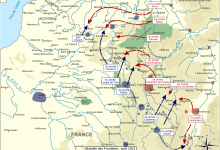The Battle of Luncarty, fought in the year 980, represents a significant chapter in the later Viking raids on Britain. Taking place in the village of Luncarty, located in the present-day Perthshire region of Scotland, this battle saw the forces of the Kingdom of Scotland face off against a Viking raiding party. The outcome, as noted in historical records, was a victory for the Scots, marking a pivotal moment in the struggle between the Norsemen and the native kingdoms of Britain.
Background
By the late 10th century, Viking raids on the British Isles were a familiar, albeit often dreaded, occurrence. The first Viking incursions into Britain had begun in the late 8th century, and by the time of the Battle of Luncarty, the Viking presence had solidified, especially in areas like Northumbria, East Anglia, and the Isles. However, the impact of Viking activity in the Kingdom of Scotland was less pronounced compared to other regions of Britain, due to Scotland’s relatively isolated position and its ability to resist external threats more effectively.
The Vikings had settled in several parts of the British Isles and were known to raid and pillage, often leaving a wake of destruction. As the Viking age progressed, the Norsemen increasingly focused on attempting to control the region, leading to fierce confrontations with the various kingdoms, including Scotland. By the time of the Battle of Luncarty, the Vikings were no longer simply raiding but were attempting to exert more lasting control.
The Battle
The exact circumstances surrounding the Battle of Luncarty are somewhat unclear, with only a few sources providing brief references to the event. It is known that the Viking forces, likely led by a Norse chieftain or a group of warlords, launched a raid on Scotland’s interior, with the objective of plundering and establishing dominance in the region. The Scots, under the leadership of King Kenneth III of Scotland, gathered their forces in defense, prepared to fight against the intruders.
The Battle of Luncarty is generally believed to have been a confrontation between the combined forces of the Scots and their allies, including local militias and regional forces, and the Viking raiders. The Vikings, despite their formidable reputation and experience in battle, were decisively defeated. This victory is often cited as an important moment in the long-standing resistance of the Scots against Viking invasions, reinforcing Scotland’s ability to resist Viking encroachment.
The Aftermath
Following their defeat at Luncarty, the Vikings were forced to retreat from the region. The Scots maintained their control over the land, marking another step in the consolidation of power in the Kingdom of Scotland. Although the Vikings would continue to pose a threat in the future, the Battle of Luncarty stood as a symbol of Scottish resilience against Viking expansion.
The victory at Luncarty is also seen as a precursor to the growing strength of the Kingdom of Scotland. In the years following the battle, Scotland began to solidify its borders and internal governance, which eventually led to its emergence as a more unified and powerful kingdom. The loss at Luncarty marked one of the last significant Viking efforts to penetrate deep into Scottish territory, though the Norsemen would continue to raid along the coasts and the islands for some time thereafter.
Conclusion
The Battle of Luncarty remains a key event in the history of the later Viking raids on Britain. While details about the battle itself are sparse, it symbolizes the ongoing struggle between the Scottish Kingdom and the Viking raiders. The Scots’ victory in 980 demonstrated their resilience and military capability, establishing them as a formidable force in the face of Viking invasions. Although the Vikings would not disappear from British shores completely, the Battle of Luncarty marked a turning point in the conflict, highlighting the Scots’ ability to defend their homeland and shaping the future of Scotland’s sovereignty in the face of external threats.

